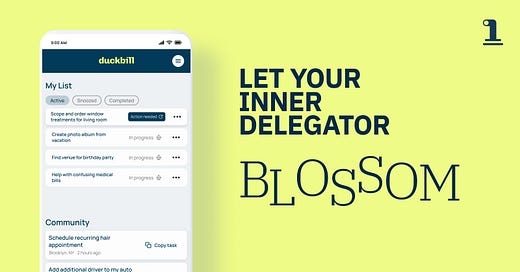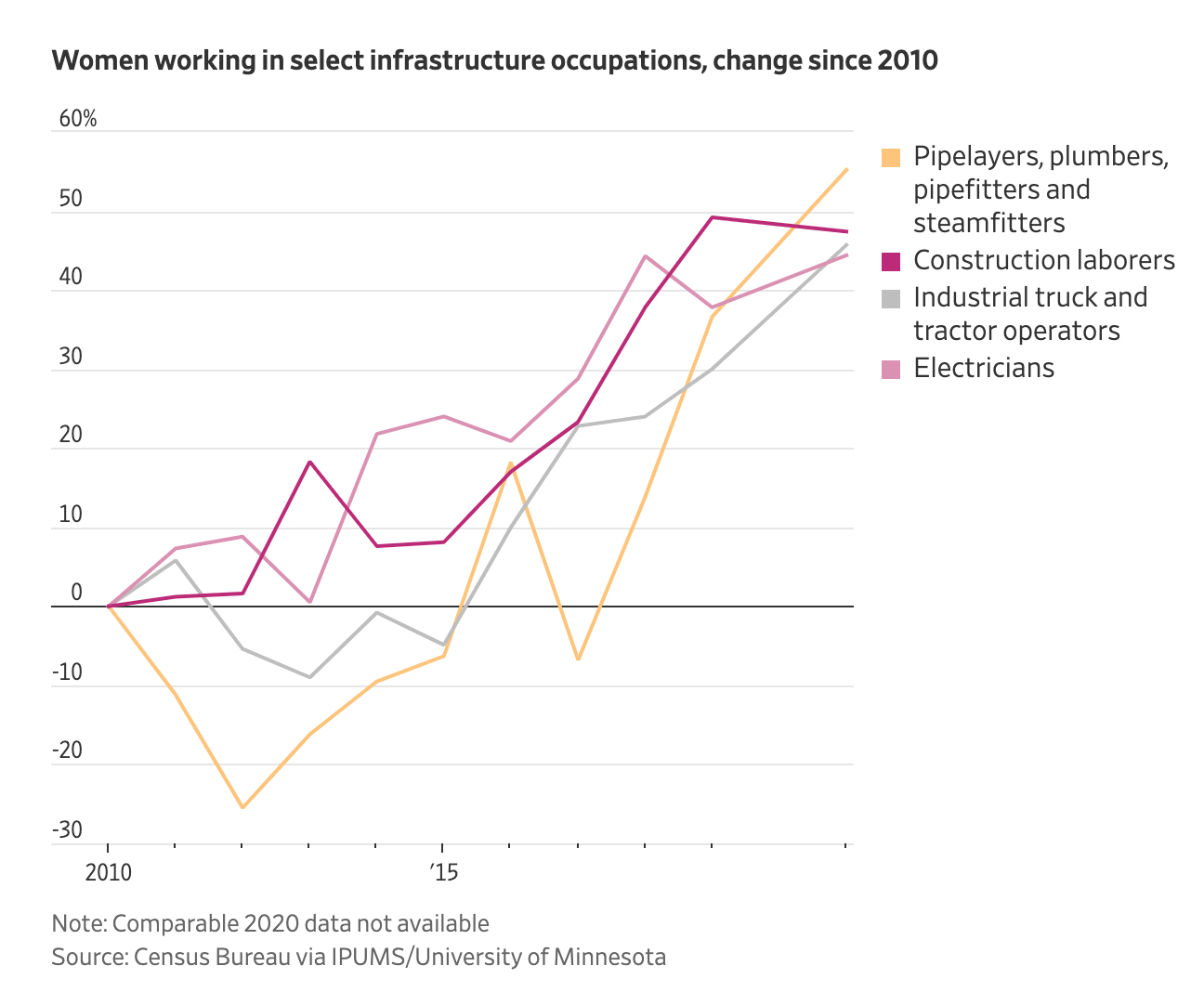The CQ | Delivering on One of Tech’s Holy Grails: Duckbill, the AI-Powered Personal Assistant
Leading Duckbill's $25M series A to solve to-do list anxiety
The CQ is Forerunner’s weekly newsletter rounding up the most pressing consumer news and analysis, plus some bonus musings from our investment team. Subscribe now to get the latest edition in your inbox every Saturday.
By Kirsten Green, Founding Partner
The idea of the tech-driven, highly-effective personal assistant has long been a bold ambition of the tech industry — an oft-attempted, but never (yet) realized opportunity. The concept is now (unsurprisingly) seeing a meaningful resurgence, underpinned by recent AI advancements. There’s never been a better time to make the blinding appeal of this kind of service a reality.
Duckbill emerged from stealth this week with a stellar team led by Meghan Joyce and $33 million in funding to finally deliver on the potential of an AI-powered personal assistant. Duckbill opts for a unique human-in-the-loop approach, where a copilot tackles consumers’ to-do lists, even the most dreaded, procrastinated tasks — and is available 24/7 with responses within 24 hrs. It’s a product where you have to experience the magic of it firsthand to believe it.
If the promise of Duckbill seems nearly unbelievable, especially in the context of being an attractive and compelling business, we would not have disagreed until we met this highly competent and special team. The company is comprised of former Uber, Whoop and Oscar leaders who are unparalleled in experience, discipline, and vision to take on this bold mission and operational challenge.
Read more about our Duckbill investment and check out the product today.
What We’re Talking About on Slack:
In the last three months, the U.S. economy got a Barbenheimer-Beyonce-Taylor Swift boost of $8.5 billion. Due to these spending gains, as well as inflation cooling and a healthy labor market, economists practically doubled their forecast for growth in the third quarter and are holding off on recession warnings. Still, some are noting that this growth is short-lived. “A large chunk of that strength comes from temporary factors. These factors create a mirage of resilient consumption, when in fact it’s running out of steam.”
Consumers are slouching toward ‘accept all cookies’ — because when everything we do online is data to be harvested (to quote that article, “we are all shedding data like skin cells”), resignation is easy. The Atlantic delves into the state of personal privacy, how to frame what exactly we’re giving up, and whether there’s a better way to think about digital privacy.
Why the "nope, don't want kids" sentiment is growing: basically: money and independence — and plenty of people aren’t ashamed to admit it anymore. A global study of 55,000 found that one in three people has decided not to have kids, and for the U.S. specifically, that number is 51%. These respondents projected to be the highest household spenders by 2030. “For businesses, it calls for a greater recognition of the adult ‘child-free by choice’ segment.”
Consumers’ economic confidence hit a decades-long low in 2022 (tied with the Great Recession), then recovered slightly in summer of 2023. After that turn in the right direction, a new Bloomberg survey predicts the American consumer is about to hit a wall. More than 50% of respondents thought that personal consumption will decrease in early 2024, and 21% believe it may happen at the end of 2023. The biggest obstacles to consumer spending in the coming months are the declining availability of credit and high mortgage rates followed by student loan repayments, say investors. “Consumers have been able to bend under the weight of higher prices. But there will come a point where that’s no longer feasible.”
What if polyester isn’t so bad after all? “Polyester is the refined sugar of our wardrobes: It’s cheap, has an iffy reputation and is in almost everything.” The petroleum-derived fabric accounted for an estimated 34 million tons of clothing in 2021 alone, little of which was recycled — but according to The Wall Street Journal, it actually responds very well to the chemical recycling process (unlike cotton), bouncing back just like new. Several startups are now working to cash in on the heaps of garments otherwise destined for the landfill. And while they will face headwinds with scaling, H&M, which has pledged to use more recycled materials by 2025, has already invested.
Just kidding about affording a home. After five months of falling prices, average home prices across the US increased in July and interest rates are at the highest they’ve been this whole century. Because the country is short 3.8 million homes to meet demand and the market has 18% fewer homes for sale than last year, experts say now is the most expensive time to buy a house. Young people are feeling it: according to a new survey from Redfin, 12% of Gen Z and about 18% of Millennials think they’ll never own a home. Interestingly, a new company is launching to scale “assumable interest rates,” where previous rates can be passed down with home purchases.
It's not news that malls have been struggling since the pandemic, which is why the owner of Westfield was intending to sell off all American properties by the end of the year. But nw Unibail-Rodamco-Westfield, Europe’s largest mall operator, has a new plan to keep its high-end malls in light of their impressive rebound. The company’s top five U.S. properties are estimated to have a combined value of $5 billion. “Occupancy at its flagship properties has reached 2019 levels and customer foot traffic and tenant sales were both up in the first half of this year compared with the same period in 2022.” These high-performing locations have added entertainment, apartments and open-air retail and restaurants beyond stores. Also: Malls that serve Asian Americans are booming as social gathering places, surviving because “they cater to a need for community.
America has generally been seen as a youthful, constantly-renewing nation — but by 2034, there will be more Americans over 65 than children. The New York Times says we’re not prepared. In their six-part feature, they address the different pressures our aging society is facing ahead of this major demographic shift, including making caregiving more accessible, reconfiguring cities, streets, and housing to be senior-friendly, and Big Tech starting to cater to a sector that has largely been ignored (when Silicon Valley does design products for older adults, it’s often purely about solving a health problem).
Companies are hiring Gen Z advisory panels as a way to maintain relevancy. PR agencies, tech startups, and retail brands are going straight to the source to get in on young people’s spending habits, preferences, and personal beliefs, getting their perspectives on naming products, developing marketing strategies, and what’s trending on TikTok. One example: Moon Juice has an advisory board of more than 20 Gen Z’ers to gut check product and brand decisions.
Women may help fix the worker shortage within infrastructure and construction. In 2021, only about 4% of construction workers were female (in 2010, it was 3%). But currently there are approximately 1 million women working in the construction industry, with projections for that to double over the next decade. The industry is trying to lure women into the field by offering child-care services, lactation pods and support for more inclusive workplaces. The uptick is notable:
Portfolio Highlights:
The Wall Street Journal tells the story of Glossier in this feature and talks to CEO Kyle Leahy on the new direction for the brand.
Doug Sweeny, CMO of Oura, joined the Earned podcast by Creator IQ to talk scaling startups and how Oura facilitates content creation.
A-Frame Brands launched a new line of baby products for textured hair called Haircare by PROUDLY available nationwide at Target and on Proudly.com.
Marisa Sharkey and Bianca Gates, co-founders of Birdies, share how they started their business on The Today Show’s “She Made It” segment.
WWD and Cosmopolitan UK cover Glossier’s plans to partner with Sephora to expand into the U.K.
Glossy reports that Glossier has again collaborated with the WNBA for a new launch of its new Stretch Fluid Foundation.
WWD discusses the continued rise of wellness wearables, with a quote from Oura CEO Tom Hale.
Forerunner Highlights:
Forerunner’s investment in Duckbill was covered in Fast Company, Axios Pro Rata, Fortune Term Sheet, StrictlyVC, and Boston Globe.
Work at a Portfolio Company:
Growth Marketing Automation Associate | Faire: Faire is an online wholesale marketplace built on the belief that the future is local — independent retailers around the globe are doing more revenue than Walmart and Amazon combined. This role will help elevate and scale the tools that power Faire’s growth marketing engine across a variety of strategies, technology platforms and data-driven testing and implementation.
Manager, Packaging Development | Glossier: Glossier is a people-first beauty company on a mission to give everyone a voice through beauty. This role will lead execution of Glossier’s stellar packaging components in support of our company’s growing product portfolio, ongoing innovation and attention to manufacturing quality.
Lifecycle Engagement Manager | Real: Real’s mission is to make caring for mental health a priority by redesigning mental healthcare to integrate empathy, design, and progressive care through in-person and digital experiences. This role will take charge of the lifecycle engagement strategy and oversee campaign efforts with a deep understanding of CRM tools, data analysis, and strategies to boost user engagement.
There are ~489 other openings on our jobs site. Check ‘em out.





